Niccolo Piccinni – Didon (2003)
Niccolo Piccinni – Didon (2003)

CD1 1. Didon, opera: Overture. Allegro maestoso 2. Didon, opera: Overture. Andante sostenuto 3. Didon, opera: Overture. Allegro sans presser 4. Didon, opera: Act One. Oui, je veux dissiper le trouble de mon coeur 5. Didon, opera: Act One. Nous allons la revoir 6. Didon, opera: Act One. Le cor nous appelle à la chasse 7. Didon, opera: Act One. Venez, enfant des Dieux 8. Didon, opera: Act One. Air de Triomphe 9. Didon, opera: Act One. Reine, aux jeux de la paix 10. Didon, opera: Act One. Garde-toi de me faire connaître 11. Didon, opera: Act One. Quelle dédaigneuse fierté 12. Didon, opera: Act One. C'est donc toi que Didon couronne? 13. Didon, opera: Act One. Courons à la vengeance 14. Didon, opera: Act Two. Au noir chagrin qui me dévore 15. Didon, opera: Act Two. Plaignez un Roi play 16. Didon, opera: Act Two. Il croira donc que je lui céde 17. Didon, opera: Act Two. D'un Héros, sur les coeurs 18. Didon, opera: Act Two. Ah! Que je fus bien inspirée CD2 1. Didon, opera: Act Two. Quelle noirceur 2. Didon, opera: Act Two. Reine, et vous, Tyriens 3. Didon, opera: Act Two. Tu sais si mon coeur est sensible 4. Didon, opera: Act Two. Tu veux me fuir 5. Didon, opera: Act Three. Non, ce n'est plus pour moi 6. Didon, opera: Act Three. Dieux des Troyens, Diex de Carthage 7. Didon, opera: Act Three. Ah! Le beau jour pour vous! 8. Didon, opera: Act Three. Au comble de la gloire 9. Didon, opera: Act Three. Vous le savez 10. Didon, opera: Act Three. Dans ce coeur malhereux 11. Didon, opera: Act Three. Quelques dangers que me prépare play 12. Didon, opera: Act Three. Inexorables Dieux! 13. Didon, opera: Act Three. Que m'annonce le Ciel par la voix du tonnerre? 14. Didon, opera: Act Three. Je veux mourir 15. Didon, opera: Act Three. Ma soeur, embrassez-moi 16. Didon, opera: Act Three. Toi que j'ai tant aimé Didon - Sibongile Mngoma Enée - Daniel Gálvez-Vallejo Iarbe - David Damiani Elise - Teresa di Bari Phénice - Angelica Girardi Araspe - Antonio Signorile Orchestra e coro del Teatro Petruzzelli de Bari Arnold Bosman - conductor, 2001
Baroque opera composers couldn't get enough of the tragic love story of Dido and Aeneas. Cavalli, Purcell, Desmarest, Porpora, Monteclair, Campra, Paisiello, and (here) Niccolo Piccinni all took a shot at it (and there may be others I don't know about). A passage from Virgil's Aeneid, the story was compact, emotional, and exotic enough to make a great stage work. Many will know the story, but for those who don't: Aeneas and his band of Trojans, fleeing the destruction of their city by the Greeks, stop in the North-African city of Carthage. The strong-willed and newly-widowed queen of Carthage, Dido, falls deeply in love with Aeneas, but (depending on the version of the story you're working with) Aeneas' commitment vacillates. A subplot with another suitor seeking Dido's hand, King Iarbas, complicates matters. Aeneas and the Trojans eventually realize they must leave to fulfill their destiny: the founding of Rome, and after they've sailed away, Dido's grief leads her to take her own life.
Some of the previous Dido operas had relied on a libretto by Metastasio, perhaps the greatest Baroque librettist of all, but Piccinni, an emigre from Italy, used a new libretto by the French author Marmontel. The resulting initial performances at Fountainebleau and Paris in the fall of 1783 were great successes. Although still a tragedie-lyrique with ballet, more recitatives by Marmontel allowed for more psychological fleshing out of the characters, along with Piccinni's wonderful music.
The recording here is taken from a live performance in 2001 in Bari (Piccinni's hometown). Live performance recording issues definitely come into play: as with most 18th century French opera, there's a lot of ballet, and a good deal of clumping around is audible, if not intrusive. There's some applause at the end of each of the three acts. And although the singers are well-miked, the orchestra has a slightly cramped sound (the most troubling aspect of this package for me). The Orchestra del Teatro Petruzzelli is apparently not a period-instruments ensemble, so this isn't an HIP recording.
But the best thing here was a surprise for me, since I expected it to be the weakest aspect: the singing. The cast is very good, if not excellent, from top to bottom. Daniel Galvez-Vallejo (Enee-Aeneas), listed as a tenor, is very dark and deep for a tenor--but that seems entirely appropriate for the character of Enee. But South African-born soprano Sibongile Mngorna (Didon-Dido) is quite a find; hers is an emotive, soulful performance which "carries" the whole work--as it should. ---Rollo Tomasi, amazon.com
Niccolò Piccinni (January 16, 1728 – May 7, 1800) was an Italian composer of symphonies, sacred music, chamber music, and opera. Although he is somewhat obscure, even to music lovers today, Piccinni was one of the most popular composers of opera—particularly the Neapolitan opera buffa—of his day. Historically, he had the misfortune of falling between the generations of his great predecessors such as Pergolesi and the greats who came after him, including Domenico Cimarosa and Mozart.
Niccolò Piccinni lub Piccini (ur. 16 stycznia 1728 w Bari, zm. 7 maja 1800 w Passy k. Paryża) – włoski kompozytor operowy. Kształcił się w ośrodku operowym w Neapolu (u Leonardo Leo i Francesco Durante). Od 1776 roku działał w Paryżu, jako główny przedstawiciel opery włoskiej. Wbrew intencjom został uznany za głównego rywala Christopha Willibalda Glucka, którego twórczość wysoko cenił (z wzajemnością). Konflikt zwolenników opery włoskiej i opery zreformowanej przez Glucka nasilił się po sukcesie oper Piccinni'ego wystawionych w Paryżu w latach 1778-80. Spory te przeszły do historii jako wojna ”piccinistów” z ”gluckistami”. W 1779 Gluck przeniósł się do Wiednia, a Piccinni rozpoczął rywalizację z Sacchinim.
download: uploaded yandex 4shared mediafire solidfiles mega filecloudio nornar
Last Updated (Sunday, 02 March 2014 13:36)








